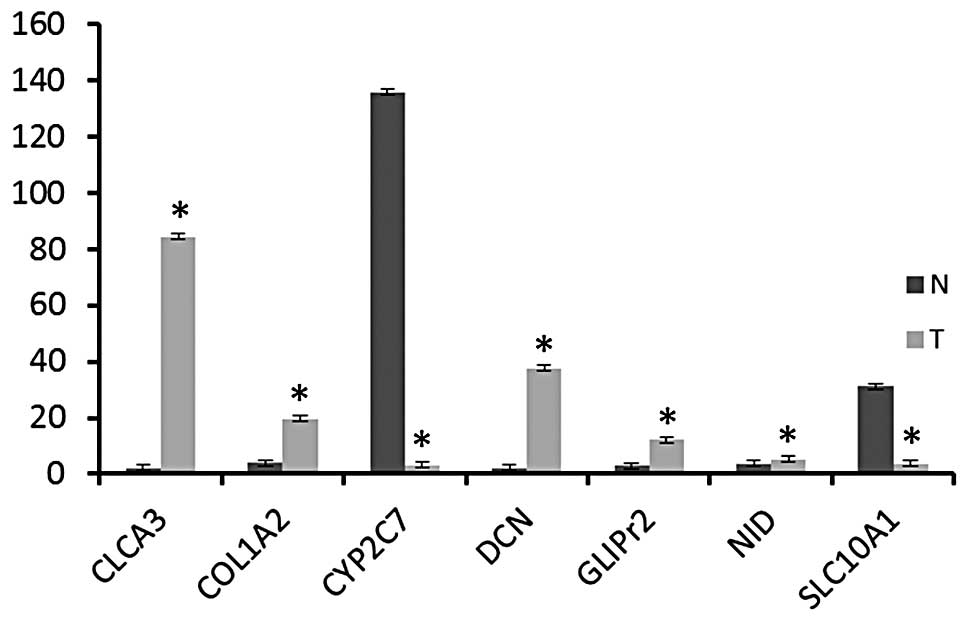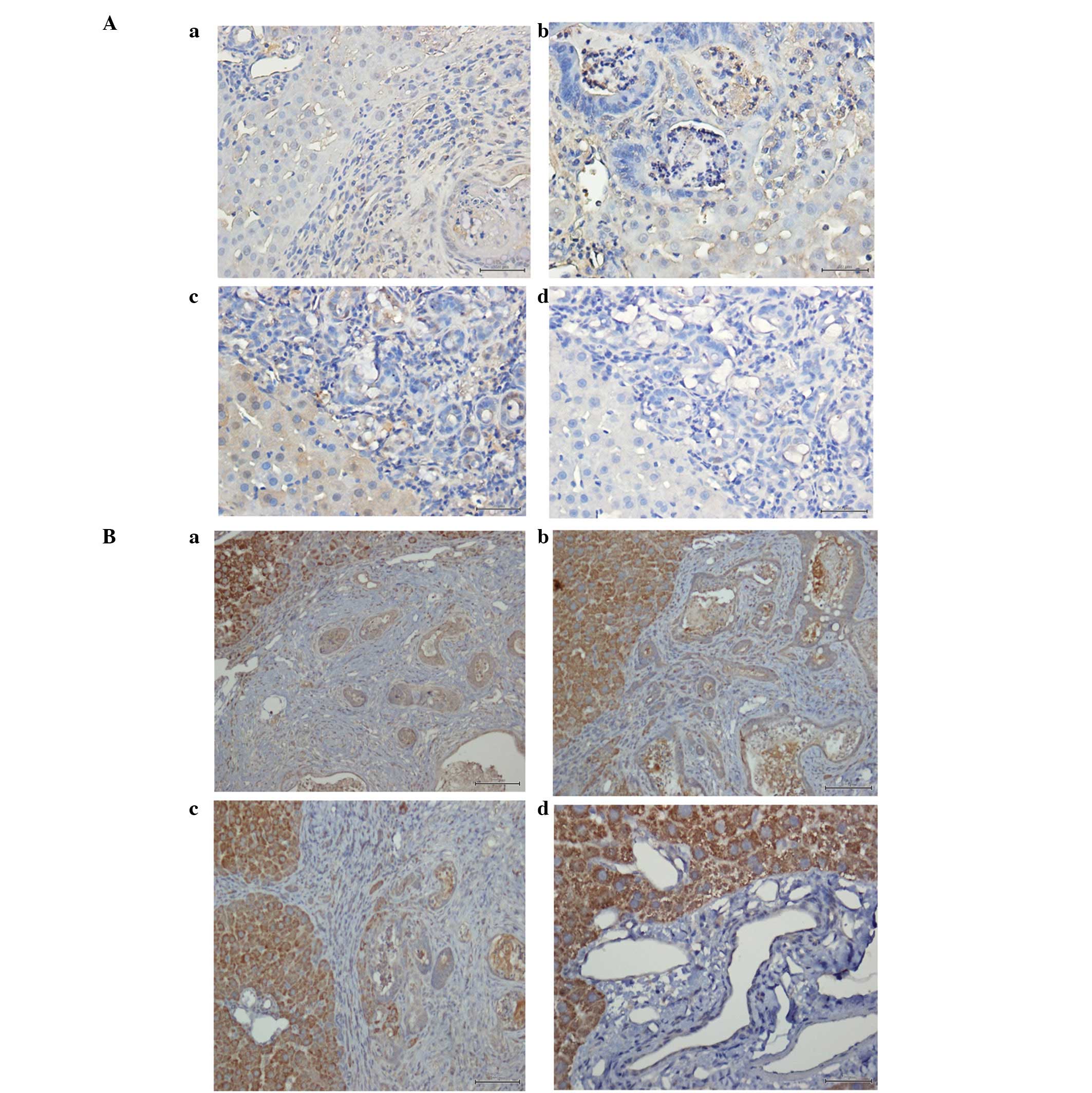|
1
|
Liver Cancer Study Group of Japan.
Classification of Primary Liver Cancer. 1st English edition.
Kanehara Press Co; Tokyo: 1997
|
|
2
|
Yeh CN, Yeh TS, Chen TC, Jan YY and Chen
MF: Gross pathological classification of peripheral
cholangiocarcinoma determines the efficacy of hepatectomy. J
Gastroenterol. Sep 25–2012.(Epub ahead of print).
|
|
3
|
Chen MF: Peripheral cholangiocarcinoma
(cholangiocellular carcinoma): clinical features, diagnosis and
treatment. J Gastroenterol Hepatol. 14:1144–1149. 1999. View Article : Google Scholar : PubMed/NCBI
|
|
4
|
Shaib YH, Davila JA, McGlynn K and
El-Serag HB: Rising incidence of intrahepatic cholangiocarcinoma in
the United States: a true increase? J Hepatol. 40:472–477. 2004.
View Article : Google Scholar : PubMed/NCBI
|
|
5
|
Patel T: Worldwide trends in mortality
from biliary tract malignancies. BMC Cancer. 2:102002. View Article : Google Scholar : PubMed/NCBI
|
|
6
|
Chang KY, Chang JY and Yen Y: Increasing
incidence of intrahepatic cholangiocarcinoma and its relationship
to chronic viral hepatitis. J Natl Compr Canc Netw. 7:423–427.
2009.PubMed/NCBI
|
|
7
|
Shaib Y and El-Serag HB: The epidemiology
of cholangiocarcinoma. Semin Liver Dis. 24:115–125. 2004.
View Article : Google Scholar : PubMed/NCBI
|
|
8
|
DeGroen PC, Gores GJ, LaRusso NF,
Gunderson LL and Nagorney DM: Biliary tract cancers. N Engl J Med.
341:1368–1378. 1999. View Article : Google Scholar : PubMed/NCBI
|
|
9
|
Albores-Saavedra J, Henson DE and Sobin
LH: The WHO histological classification of tumors of the
gallbladder and extrahepatic bile ducts. A commentary on the second
edition. Cancer. 70:410–414. 1992. View Article : Google Scholar : PubMed/NCBI
|
|
10
|
Weber SM, Jarnagin WR, Klimstra D,
DeMatteo RP, Fong Y and Blumgart LH: Intrahepatic
cholangiocarcinoma: resectability, recurrence pattern and outcomes.
J Am Coll Surg. 193:384–391. 2001. View Article : Google Scholar : PubMed/NCBI
|
|
11
|
Uenishi T, Hirohashi K, Kubo S, et al:
Histologic factors affecting prognosis following hepatectomy for
intrahepatic cholangiocarcinoma. World J Surg. 25:865–869. 2001.
View Article : Google Scholar : PubMed/NCBI
|
|
12
|
Jarnagin WR, Fong Y and DeMatteo RP:
Staging, resectability and outcome in 225 patients with hilar
cholangiocarcinoma. Ann Surg. 234:507–519. 2001. View Article : Google Scholar : PubMed/NCBI
|
|
13
|
Patel T: Increasing incidence and
mortality of primary intrahepatic cholangiocarcinoma in the United
States. Hepatology. 33:1353–1357. 2001. View Article : Google Scholar : PubMed/NCBI
|
|
14
|
Shirabe K, Shimada M and Harimoto N:
Intrahepatic cholangiocarcinoma: Its mode of spreading and
therapeutic modalities. Surgery. 131:S159–S164. 2002. View Article : Google Scholar : PubMed/NCBI
|
|
15
|
Bathe OF, Pacheco JT and Ossi PB:
Management of hilar bile duct carcinoma. Hepatogastroenterology.
48:1289–1294. 2001.PubMed/NCBI
|
|
16
|
Yeh CN, Maitra A, Lee KF, Jan YY and Chen
MF: Thioacetamide-induced intestinal-type cholangiocarcinoma in
rat: an animal model recapitulating the multi-stage progression of
human cholangiocarcinoma. Carcinogenesis. 25:631–636.
2004.PubMed/NCBI
|
|
17
|
Terada T, Nakanuma Y and Sirica AE:
Immunohistochemical demostration of MET overexpression in human
intrahepatic cholangiocarcinoma and in hepatolithiasis. Hum Pathol.
29:175–180. 1998. View Article : Google Scholar : PubMed/NCBI
|
|
18
|
Endo K, Yoon BI, Pairojkul C, Demetris AJ
and Sirica AE: ERBB-2 overexpression and cyclooxygenase-2
up-regulation in human cholangiocarcinoma and risk conditions.
Hepatology. 36:439–450. 2002. View Article : Google Scholar : PubMed/NCBI
|
|
19
|
Hansel DE, Rahman A, Hidalgo M, et al:
Identification of novel cellular targets in biliary tract cancers
using global gene expression technology. Am J Pathol. 163:217–229.
2003. View Article : Google Scholar : PubMed/NCBI
|
|
20
|
Yeh CN, Pang ST, Wu RC, Chen TW, Jan YY
and Chen MF: Prognostic value of MUC4 for mass-forming intrahepatic
cholangiocarcinoma after hepatectomy. Oncol Rep. 21:49–56.
2009.PubMed/NCBI
|
|
21
|
National Institutes of Health. Guide for
the Care and Use of Laboratory Animals. NIH publication no. 85–23,
revised 1996.
|
|
22
|
Pang ST, Dillner K, Wu X, Pousette A,
Norstedt G and Flores-Morales A: Gene expression profiling of
androgen deficiency predicts a pathway of prostate apoptosis that
involves genes related to oxidative stress. Endocrinology.
143:4897–906. 2002. View Article : Google Scholar : PubMed/NCBI
|
|
23
|
Kanehisa M, Goto S, Sato Y, Furumichi M
and Tanabe M: KEGG for integration and interpretation of
large-scale molecular datasets. Nucleic Acids Res. 40:D109–D114.
2012. View Article : Google Scholar : PubMed/NCBI
|
|
24
|
Kanehisa M and Goto S: KEGG: Kyoto
encyclopedia of genes and genomes. Nucleic Acids Res. 28:27–30.
2000. View Article : Google Scholar : PubMed/NCBI
|
|
25
|
Huang DW, Sherman BT and Lempicki RA:
Systematic and integrative analysis of large gene lists using DAVID
bioinformatics resources. Nature Protoc. 4:44–57. 2009.PubMed/NCBI
|
|
26
|
Huang DW, Sherman BT and Lempicki RA:
Bioinformatics enrichment tools: paths toward the comprehensive
functional analysis of large gene lists. Nucleic Acids Res.
37:1–13. 2009. View Article : Google Scholar : PubMed/NCBI
|
|
27
|
Dasgupta A, Chatterjee R and Chowdhury JR:
Thioacetamide-induced hepatocarcinoma in rat. Oncology. 38:249–253.
1981. View Article : Google Scholar : PubMed/NCBI
|
|
28
|
Fitzhugh OG and Nielson AA: Liver tumors
in rats fed thiourea or thioacetamide. Science. 108:626–628. 1948.
View Article : Google Scholar : PubMed/NCBI
|
|
29
|
Al-Bader AA, Mathew TC, Abul H, Al-Mosawi
M, Panigrahi D and Dashti HM: Bacterial translocation in
thioacetamide induced liver cirrhosis. J R Coll Surg Edinb.
43:278–82. 1998.PubMed/NCBI
|
|
30
|
Lee JW, Shin KD, Lee M, et al: Role of
metabolism by flavin-containing monooxygenase in
thioacetamide-induced immunosuppression. Toxicol Lett. 136:163–172.
2003. View Article : Google Scholar : PubMed/NCBI
|
|
31
|
Dashti H, Jeppsson B, Hagerstrand I, et
al: Early biochemical and histological changes in rats exposed to a
single injection of thioacetamide. Pharmacol Toxicol. 60:171–174.
1987. View Article : Google Scholar : PubMed/NCBI
|
|
32
|
Gallagher CH, Gupta DN, Judah JD and Rees
KK: Biochemical changes in acute thioacetamide intoxication. J Path
Bact. 72:193–201. 1956. View Article : Google Scholar : PubMed/NCBI
|
|
33
|
Gupta DN: Acute changes in the liver after
administration of thioacetamide. J Pathol Bacteriol. 72:183–192.
1956. View Article : Google Scholar : PubMed/NCBI
|
|
34
|
Muller D, Zimmerman SI and Schiller F:
Drug metabolism in rat liver injured by thioacetamide. Arch
Toxicol. 5:368–371. 1982. View Article : Google Scholar
|
|
35
|
Dashti HM, Mathew TC, Jadaon MM and
Ashkanani E: Zinc and liver cirrhosis: biochemical and
histopathologic assessment. Nutrition. 13:206–212. 1997. View Article : Google Scholar : PubMed/NCBI
|
|
36
|
Sirica AE, Lai GH and Zhang Z: Biliary
cancer growth factor pathways, cyclo-oxygenase-2 and potential
therapeutic strategies. J Gastroenterol Hepatol. 16:363–372. 2001.
View Article : Google Scholar : PubMed/NCBI
|
|
37
|
Nelson DR, Zeldin DC, Hoffman SM, Maltais
LJ, Wain HM and Nebert DW: Comparison of cytochrome P450 (CYP)
genes from the mouse and human genomes, including nomenclature
recommendations for genes, pseudogenes and alternative-splice
variants. Pharmacogenetics. 14:1–18. 2004. View Article : Google Scholar
|
|
38
|
Henderson CJ, Russell AL, Allan JA and
Wolf CR: Sexual differentiation and regulation of cytochrome P-450
CYP2C7. Biochim Biophys Acta. 1118:99–106. 1992. View Article : Google Scholar : PubMed/NCBI
|
|
39
|
Arun KA and Bernard HS: Latent
overexpression of hepatic CYP2C7 in adult male and female rats
neonatally exposed to phenobarbital: a developmental profile of
gender-dependent P450s. J Pharmacol Exp Ther. 293:1027–1033.
2000.PubMed/NCBI
|
|
40
|
Hagenbuch B, Stieger B, Foguet M, Lübbert
H and Meier PJ: Functional expression, cloning and characterization
of the hepatocyte Na+/bile acid cotransport system. Proc
Natl Acad Sci USA. 88:10629–10633. 1991. View Article : Google Scholar : PubMed/NCBI
|
|
41
|
Trauner M, Meier PJ and Boyer JL:
Molecular regulation of hepatocellular transport systems in
cholestasis. J Hepatol. 31:165–178. 1999. View Article : Google Scholar : PubMed/NCBI
|
|
42
|
Kjellén L and Lindahl U: Proteoglycans:
structures and interactions. Annu Rev Biochem. 60:443–475.
1991.
|
|
43
|
Santra M, Eichstetter I and Iozzo RV: An
anti-oncogenic role for decorin. Downregulation of ErbB2 leads to
growth suppression and cytodifferentiation of mammary carcinoma
cells. J Biol Chem. 275:35153–35161. 2000. View Article : Google Scholar : PubMed/NCBI
|
|
44
|
Zhang Z, Li XJ, Liu Y, Zhang X, Li YY and
Xu WS: Recombinant human decorin inhibits cell proliferation and
downregulates TGF-beta1 production in hypertrophic scar
fibroblasts. Burns. 33:634–641. 2007. View Article : Google Scholar : PubMed/NCBI
|
|
45
|
Abhijit GB, Indraneel B, William ML and
Jamboor KV: Aberrant expression and localization of decorin in
human oral dysplasia and squamous cell carcinoma. Cancer Res.
63:7769–7776. 2003.PubMed/NCBI
|
|
46
|
Pujuguet P, Simian M, Liaw J, Timpl R,
Werb Z and Bissell MJ: Nidogen-1 regulates laminin-1-dependent
mammary-specific gene expression. J Cell Sci. 113:849–858.
2000.PubMed/NCBI
|
|
47
|
Baxter RM, Crowell TP, George JA, Getman
ME and Gardner H: The plant pathogenesis related protein GLIPR-2 is
highly expressed in fibrotic kidney and promotes epithelial to
mesenchymal transition in vitro. Matrix Biol. 1:20–29. 2007.
View Article : Google Scholar
|
















